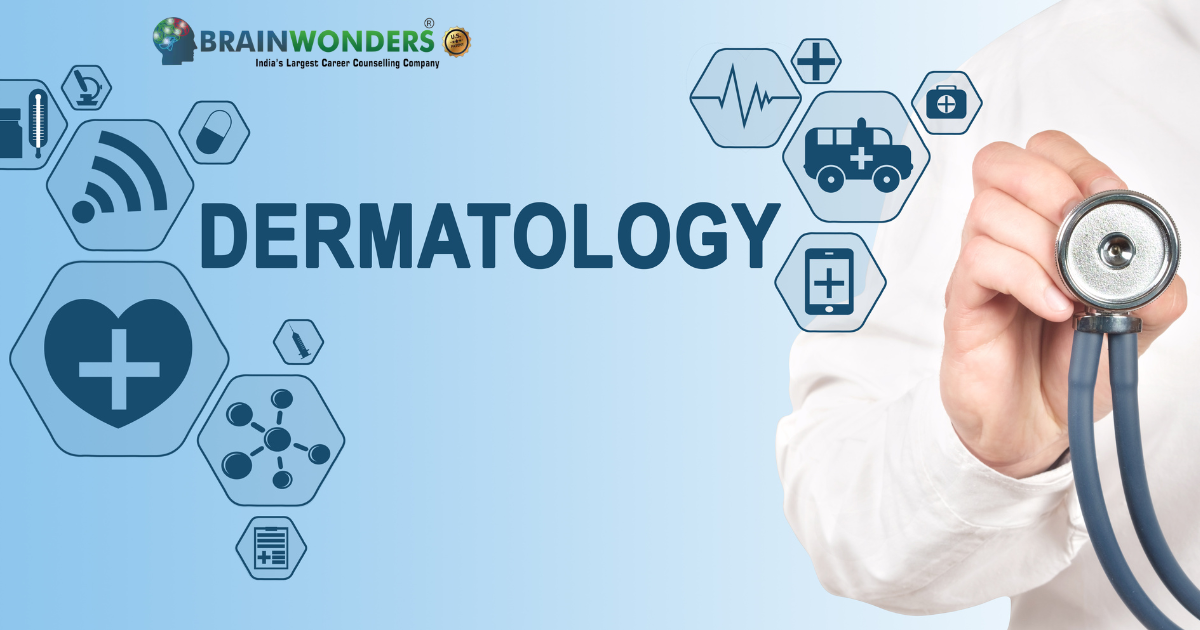

Let the best team of psychologists and career counsellors help you achieve your dream career!
Get your U.S. Patented DMIT analysis and lead the way to a happy and successful career
Blog
17 January,2024 | By Brainwonders

Embarking on a career in dermatology courses immediately after completing the 12th grade opens the door to a fascinating intersection of science and beauty. The phrase "Dermatology Courses After 12th" encapsulates the exciting journey awaiting young students eager to delve into the intricacies of skin health. Amidst the myriad of choices available post-12th, dermatology courses stand out as a distinctive path, especially appealing to those intrigued by our body's largest organ—the skin.
Dermatology courses after the 12th blend rigorous scientific knowledge with hands-on practical experience, equipping students with the skills to recognize and address various skin issues. Whether one's interest lies in the medical aspects of dermatology, dealing with diseases and clinical matters, or leaning more towards the cosmetic realm, involving aesthetics and procedures, these courses provide diverse avenues for specialization.
As the demand for skincare professionals continues to soar, dermatology courses after the 12th are crucial, bridging theoretical knowledge from textbooks to real-world scenarios. Students gain a comprehensive understanding of skin science and acquire practical skills through internships and real-world exposure. The allure of diving into dermatology immediately after high school lies in the opportunity to become part of a dynamic field that addresses health and beauty.
If you're new to the world of biological sciences, let's begin by understanding the definition of dermatology courses. These educational programs focus on imparting knowledge about skin care. You can enrol in these courses after completing high school, and they combine theoretical learning from textbooks with practical, hands-on experiences.
The primary objective is to equip you with the skills to identify and address various skin issues. Given the high demand for skin care experts, these courses facilitate applying classroom knowledge to real-life situations through internships. It's an exciting journey where your curiosity transforms you into a knowledgeable and skilled skin expert.
Dermatology is currently in high demand. In our polluted environment, nearly every person visits a dermatologist at least once or twice a year. In this section, we will explore the top 5 potential benefits of opting for dermatology courses after the 12th grade:
As dermatology courses fall within a crucial scientific domain, they adhere to specific eligibility criteria and entrance exam requirements. In this section, let's explore the eligibility criteria for pursuing dermatology courses after the 12th grade:
Specific essential skills are beneficial when considering dermatology courses after the 12th grade. The table below outlines some of the commonly sought-after skills for these courses.
| Scientific Aptitude | Manual Dexterity |
| Attention to Detail | Critical Thinking |
| Communication Skills | Patience |
| Empathy | Ethical Judgment |
| Problem-Solving | Adaptability |
Are you still seeking satisfaction? Are you in search of something more? Well, we understand what you've been searching for, and now is the moment to provide you with that information! This section will highlight some top dermatology courses after the 12th that you may want to consider. The duration and course type are also outlined alongside the courses.
| Course Name | Duration | Course Type |
| BSc in Dermatology | 3 years | Undergraduate |
| MBBS with Dermatology specialization | 5.5 years | Undergraduate |
| BDVL (Bachelor of Dermatology, Venereology, and Leprosy) | 3 years | Undergraduate |
| BSc in Cosmetic Science and Dermatology | 3 years | Undergraduate |
| Diploma in Dermatology | 1 year | Diploma |
| Diploma in Skin and VD (Venereology and Dermatology) | 1 year | Diploma |
| PG Diploma in Clinical Dermatology | 1 year | Postgraduate Diploma |
| MSc in Dermatology | 2 years | Postgraduate |
| MD in Dermatology | 3 years | Postgraduate |
| MSc in Dermatology, Venereology, and Leprosy | 3 years | Postgraduate |
The BSc in Dermatology offers a captivating three-year journey, immersing you in the fascinating realm of skin. This program delves into the intricacies of the skin, exploring its components, functions, and potential issues. The curriculum combines theoretical knowledge from textbooks with practical, hands-on experiences, preparing you to analyse and address various skin-related challenges. It's a dynamic blend of academic learning and practical skills, ensuring you can understand and rectify different skin problems.
In the MBBS program specialising in Dermatology, you embark on a 5.5-year medical journey that provides extensive knowledge about the skin. The curriculum covers topics such as the components of the skin, potential issues, and methods for treating various skin problems. This program offers a balanced mix of theoretical study and hands-on experiences, preparing you to excel in skin care. By combining reading with practical learning, the program ensures you are well-prepared to effectively manage and address a range of skin-related issues.
The BDVL, a three-year Bachelor's program, offers a deep dive into skin, venereal diseases, and leprosy. The curriculum encompasses detailed dermatology, venereology, and leprosy studies, covering anatomy, pathology, and treatment methods. This comprehensive course provides you with the knowledge and skills to comprehend, diagnose, and effectively manage various skin-related conditions.
The BSc in Cosmetic Science and Dermatology is an engaging three-year program that seamlessly blends art and science. The curriculum covers skincare formulations, cosmetic chemistry, and dermatological practices. Immerse yourself in the aesthetics of skin health, delving into topics such as beauty products, procedures, and hands-on techniques. This exciting undergraduate journey equips you with the skills to enhance and preserve the natural allure of the skin.
The Diploma in Dermatology is a one-year course designed to equip you with the knowledge and skills to comprehend and address various skin issues. The curriculum covers different skin conditions, their causes, and treatment methods. This hands-on program ensures you learn the theoretical aspects and actively practice and apply your knowledge in real-world scenarios.
The Diploma in Skin and VD (Venereology and Dermatology) is a one-year course dedicated to comprehending and treating skin and venereal diseases. Gain knowledge about different skin conditions, their causes, and effective treatment methods. This hands-on program is designed to provide practical skills, preparing you to diagnose and address various dermatological and venereal issues.
The PG Diploma in Clinical Dermatology is a one-year program that immerses you in the practical aspects of skin health. Delve into subjects such as clinical practices, treatments, and hands-on skills. This course establishes a vital link between theoretical knowledge and real-life situations, ensuring you are well-prepared to apply what you've learned in books to diagnose and effectively manage dermatological conditions.
The MSc in Dermatology is a two-year journey that delves deep into the science of skin health. The curriculum includes advanced studies in dermatological theories, treatments, and research methods. This master's program seamlessly combines in-depth learning with hands-on experiences, preparing you to expertly understand, analyse, and contribute to the evolving field of dermatology.
The MD in Dermatology is a three-year postgraduate program on the medical aspects of skin health. This journey involves an in-depth study of diseases, clinical practices, and treatments. On the other hand, the MSc in Dermatology, a two-year master's program, delves deeper into skin science with advanced studies on theories, treatments, and research methods. Both programs are designed to prepare you for specialised roles in the field of dermatology.
The MSc in Dermatology, Venereology, and Leprosy is a two-year program that delves into various aspects of skin health. The curriculum covers advanced studies in dermatology, venereal diseases, and leprosy, immersing students in theories, treatments, and research methods. This master's program is designed to provide expertise in diagnosing and managing diverse skin-related conditions, preparing individuals for specialised roles in dermatological care.
India hosts premier colleges across various disciplines, and since dermatology is a specialisation in medicine, the top medical colleges in India often coincide with the top dermatology colleges. The table below details leading colleges offering dermatology courses after the 12th grade.
| College Name | Location |
| All India Institute of Medical Sciences (AIIMS) | New Delhi |
| Christian Medical College (CMC) | Vellore, Tamil Nadu |
| Kasturba Medical College (KMC) | Manipal, Karnataka |
| Maulana Azad Medical College (MAMC) | New Delhi |
| Armed Forces Medical College (AFMC) | Pune, Maharashtra |
| Postgraduate Institute of Medical Education and Research (PGIMER) | Chandigarh |
| Grant Medical College and Sir J.J. Group of Hospitals | Mumbai, Maharashtra |
| Stanley Medical College (SMC) | Chennai, Tamil Nadu |
| King George’s Medical University (KGMU) | Lucknow, Uttar Pradesh |
| Institute of Medical Sciences Banaras Hindu University (IMS-BHU) | Varanasi, Uttar Pradesh |
The average tuition fees for dermatology courses after the 12th in India can vary, contingent on the type of course and the institution. A rough estimate across undergraduate, postgraduate, and diploma courses suggests that the average tuition fees may range from INR 10,000 to INR 20 lakh per year.
These figures are approximate and subject to variations based on factors such as the institution's reputation, course duration, and the facilities offered. For precise and up-to-date fee information, it is recommended to check with specific institutions.
Graduates of dermatology courses after the 12th can anticipate a promising placement scenario, with diverse career opportunities in medical institutions, research organizations, and the cosmetic industry. Hospitals and clinics, being significant employers, offer roles in dermatological practice, diagnosis, and treatment. Renowned medical institutions such as AIIMS, CMC, and PGIMER provide avenues for specialization and research.
Dermatology graduates can secure positions in skincare and beauty companies within the cosmetic industry, contributing to product development, clinical testing, and providing expert advice. Esteemed brands such as Himalaya, Johnson & Johnson, and Cipla actively recruit dermatology graduates. The healthcare sector in India is expanding, generating a consistent demand for dermatology professionals. Graduates can explore positions in public and private hospitals, pharmaceutical companies, and wellness clinics. Notable recruiting companies include Apollo Hospitals, Fortis Healthcare, and Sun Pharma. To find dermatology jobs in India, job portals such as Naukri.com and Indeed.com offer a range of opportunities for dermatologists to explore.
Dermatology stands out as a highly sought-after field within the medical sector, offering abundant job opportunities for individuals who have completed dermatology courses after the 12th grade. The table below outlines some of the top job roles in this domain and their average salaries.
| Top Job Roles | Average Salary |
| Dermatologist | INR 14.48 LPA |
| Cosmetic Dermatologist | INR 13 LPA |
| Dermatology Researcher | INR 8.55 LPA |
| Dermatology Nurse | INR 12 LPA |
| Aesthetic Medicine Specialist | INR 5.40 LPA |
| Clinical Dermatology Assistant | INR 3-4 LPA |
| Dermatology Sales Representative | INR 3.03 LPA |
| Dermatology Professor | INR 19 LPA |
In summary, Dermatology Courses After 12th offer more than just traditional education – they open the door to a world where science converges with the intricacies of the skin. These courses not only delve into medical aspects but also explore the exciting realm of enhancing skin aesthetics. Whether your aspirations involve becoming a dermatologist in a bustling hospital, delving into skin science research, or working in the beauty industry, these courses encompass many possibilities. It's not just about learning; it's about transforming your interest into a lasting passion for the fascinating world of human skin.
We trust that you now have the essential information to make an informed career decision. However, if the process seems daunting, we're here to help. Brainwonders offers Career Counselling to assist you in understanding your capabilities and making the right career choices. Explore Brainwonders College & Course Selection Program today to set a path toward a successful future!
How can I become a dermatologist after completing the 12th grade? To pursue a career as a dermatologist after the 12th grade, you should enrol in an MBBS program and then specialize in dermatology through postgraduate studies.
Q1. What is the recommended course for aspiring dermatologists?
Ans: The ideal course for those aspiring to become dermatologists is an MD or MS in Dermatology, which follows the completion of an MBBS degree.
Q2. Is studying dermatology challenging?
Ans: Studying dermatology can be demanding, as it requires dedication to grasp the intricacies of medicine and develop practical skills.
Q3. Which courses provide the best preparation for a career in dermatology?
Ans: For a career in dermatology, the most suitable courses are MBBS followed by MD or MS in Dermatology, offering specialized knowledge in the field.
Q4. Is NEET required for Dermatology?
Ans: Yes, admission to dermatology courses, including MBBS programs, necessitates clearing the NEET (National Eligibility cum Entrance Test). This is the initial step toward becoming a dermatologist.
Let the best team of psychologists and career counsellors help you achieve your dream career!



,_Syllabus,_Pattern,_Old_Question_Papers.png)

